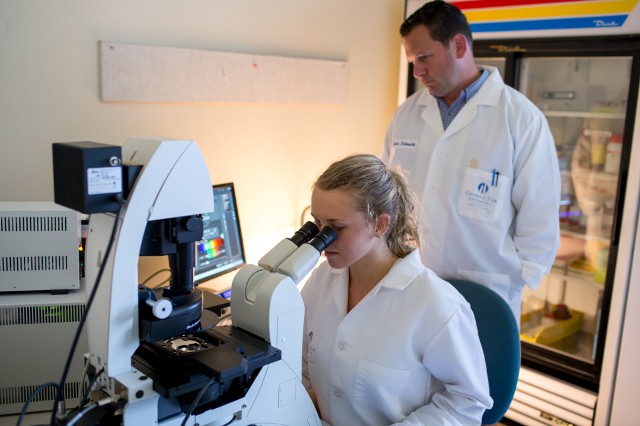Jul 15 2015
George Fox University’s Department of Biology and Chemistry added a new state-of-the-art confocal microscope in June, giving the school the distinction of being the only private Christian college on the West Coast to own the instrument.

Engineered and manufactured by Leica Microsystems in Germany, the microscope typically costs approximately $180,000. George Fox made the purchase through a start-up grant from Leica and university funds.
Confocal microscopy represents a type of microscopy that leverages laser physics to provide high-resolution data to uncover the relationships of molecules within a sample. The confocal microscope exhibits a relatively new type of microscopy compared to traditional electron or brightfield microscopes because it can be used to image living cells, tissues, organs, systems and entire organisms.
Leica is the world leader in confocal microscopy systems and is revolutionizing the field of biology by manufacturing instruments that allow scientists to see individual molecules of DNA, RNA or protein among other molecules inside of living systems. George Fox’s instrument is mounted on a unique table to eliminate vibration and uses four solid-state lasers to visualize molecules. It can be fully automated to view multiple samples through a computer interface.
The new microscope is also highly versatile in that it will allow faculty and students to make comparisons of specific genes, proteins and other molecules in living and developing biological systems in four dimensions, including time. In contrast, traditional microscopy does not typically allow for imaging specific molecules inside of developing cells, organs or systems. This level of sophistication will allow students to measure molecular changes and construct them into 3D images and study them over time.
Faculty members are already planning cutting-edge research experiments and teaching laboratories. For example, biology professor Jim Smart will be able to examine unique genes and proteins in the developing brain. Additionally, biology professor John Schmitt plans to detect and measure specific types of proteins that are causing living cancer cells to grow and spread.
“We believe this instrument will serve our students and faculty well into the future as well as provide a remarkable distinction for our program,” Schmitt said.
George Fox University is ranked by Forbes among the top Christian universities in the country and is a Christian college classified by U.S. News & World Report as a first-tier regional university. More than 3,700 students attend classes on the university’s campus in Newberg, Ore., and at teaching centers in Portland, Salem and Redmond, Ore. George Fox offers bachelor’s degrees in more than 40 majors, degree-completion programs for working adults, six seminary degrees, and 11 master’s and doctoral degrees.